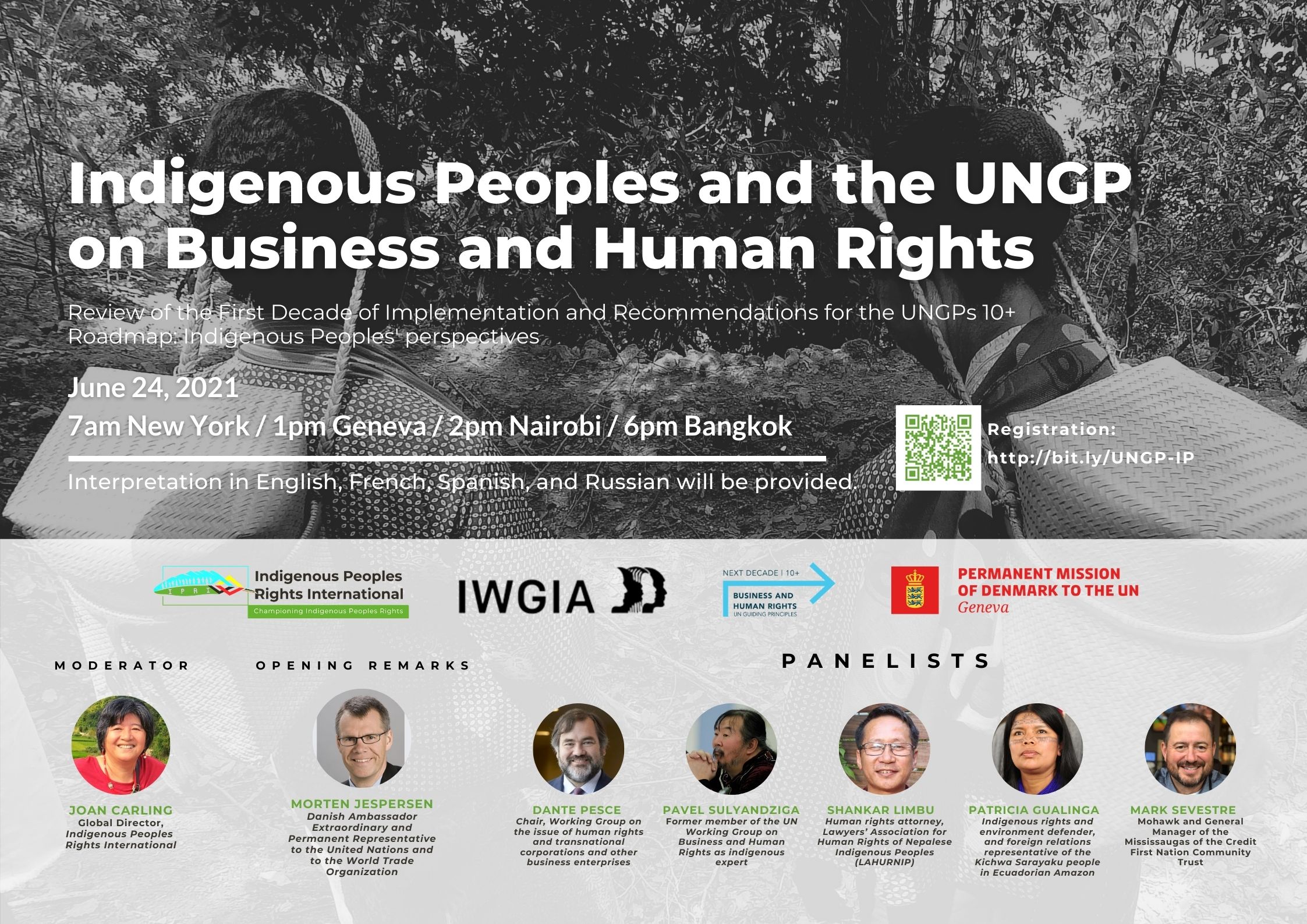Indigenous Peoples and the United Nations Guiding Principles on Business and Human Rights
Co-organizers
Indigenous Peoples Rights International (IPRI) and International Work Group for Indigenous Affairs (IWGIA)
Background
The adoption of the UN Guiding Principles on Business and Human Rights (UNGPs) in 2011 was a milestone achievement by the international community. The first decade of implementation has seen significant progress in terms of policy-level commitments to protect and respect human rights in the context of business activities. These developments have helped raise awareness and attention to the concerns of Indigenous Peoples in relation to business. Nonetheless, Indigenous Peoples continue facing gross human rights violations related to business activities in their traditional lands and territories. Moreover, new and emerging threats such as criminalization have put at risk defenders and their communities when opposing business projects in their lands and territories.
IPRI and IWGIA convened a working session with indigenous experts and support organizations to reflect upon the first decade of implementation of the UNGPs and develop recommendations for the second decade. As well as strengthening the respect and protection of the individual and collective rights of Indigenous Peoples, and their access to justice in relation to business activities.
The result of this working session in relation to the progress, gaps, challenges and lessons learned will be presented in this side event. Members of the Working Group on Business and Human Rights will also share insights from their own stocktaking of the UNGPs first decade (UNGPs 10+) and reflect on lessons learned in relation to the UNGPs and indigenous peoples. The Working Group's stocktaking will be the basis for a "roadmap for the next decade" for States and business, to be presented later in the year. A representative from the private sector and government are invited to present their initiatives and engage in a constructive dialogue with Indigenous Peoples.
Aims of the side-event
- To raise awareness on the progress, lessons learned, gaps and from the first decade of UNGPs implementation in relation to Indigenous Peoples;
- To provide an avenue for exchange and interaction between Indigenous Peoples, members of the UN Working Group, business and States towards advancing the respect and protection of Indigenous Peoples’ rights on the ground in relation to business.
Speakers and Moderator
Moderator
Joan Carling | Director Indigenous Peoples Rights International. General Secretary of the Asia Indigenous People Pact (AIPP) 2008-2016. Member of the Permanent Forum on Indigenous Issues (2014-2016). Co-convenor of the Indigenous Peoples’ Major Group for Sustainable Development-IPMG.
Opening Remarks
Morten Jespersen | Danish Ambassador Extraordinary and Permanent Representative to the United Nations and to the WTO. Former Under-Secretary for Global Development and Cooperation in the Danish development organization within the Danish Ministry of Foreign Affairs. Mr Morten Jespersen has over 25 years of experience in development cooperation and foreign affairs, including areas such as foreign and development policy, employment in developing countries, development and implementation of humanitarian efforts and development cooperation.
Speakers
Dante Pesce | Chair of the Working Group on the issue of human rights and transnational corporations and other business enterprises. Masters in Political Science from the Catholic University of Chile and a Masters in Public Administration from Harvard University. He is the Founder and Executive Director of the VINCULAR Center for Social Responsibility and Sustainable Development at the Catholic University of Valparaiso, Chile (2001-currently), working in 14 Latin American countries.
Pavel Sulyandziga | Founder and President of Batani Foundation. Former Member of the United Nations Working Group on Business and Human Rights. Former member of the Public Chamber of Russia. Until 2010, he was the first vice-president of the Russian Association of Indigenous Peoples of the North (RAIPON), and a member of the United Nations Permanent Forum on Indigenous Issues (2005-2011).
Shankar Limbu | Human rights attorney with the Lawyers’ Association for Human Rights of Nepalese Indigenous Peoples (LAHURNIP). Legal advisor for numerous indigenous organizations in Nepal. Provides advice to promote, protect and defend the human rights of indigenous peoples in Nepal, and other countries.
Patricia Gualinga | Indigenous rights and environment defender, and foreign relations representative of the Kichwa Sarayaku people in Ecuadorian Amazon. Patricia is a national and international leader and Sarayaku spokeswoman that promotes the call to keep fossil fuels underground in the Amazon.
Mark Sevestre | Mohawk Member of the Six Nations of the Grand River First Nation in Ontario, Canada. Senior Advisory and Founding Member of the National Aboriginal Trust Officers Association and in partnership with the Shareholder Association for Research and Education is a contributing leader to the Reconciliation and Responsible Investment Initiative. Mark is the General Manager of the Mississaugas of the Credit First Nation Community Trust, a $25 million First Nation-based trust fund.


